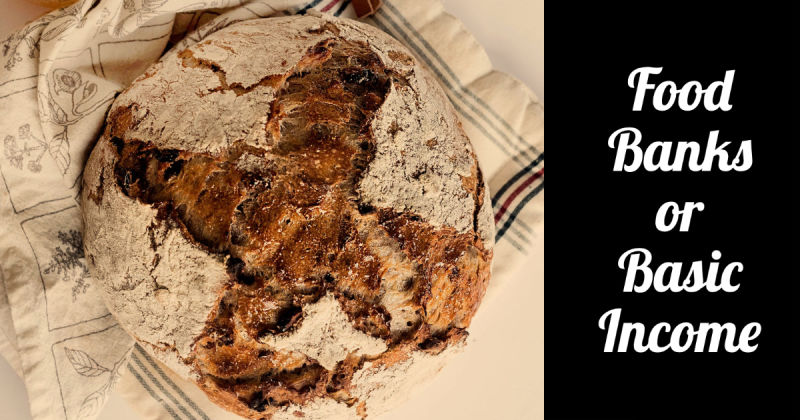Food Banks or Basic Income
The Church needs to embrace Basic Income or be complicit with social injustice.

They use lies and vicious rhetoric, while dreaming up more schemes to defraud the poor; while all the time the poor just cry out for justice.
Isaiah 32:7
I came across this verse from the prophet Isaiah at a time when I was doing a lot of campaigning work against austerity. To me it sums up powerfully the situation in modern Britain.
But it also raises an important question for the Church: Does the Church conspire with the powerful or stand with Isaiah and the poor?
Christians often fall victim to pride - there’s a danger that we think we’re better than other folk - more moral, more virtuous, even more humble. Worse, this sense of superiority often turns into an active disregard (although often dressed in the clothes of pity and charity) for those who are poor or disadvantaged in some way. For instance Citizen Network and the Centre for Welfare Reform recently carried out a survey to explore what principles should underpin the benefit system. Comparing the responses of Christians to Atheists then Christians come out much worse:
When asked about whether benefits should be conditional 19% of Christians thought that people who get benefits need to be managed and sanctioned if they break the rules; compared to 6% of atheists. As a Christian this finding fills me with shame.
Part of the reason why Christians so often fall into the trap of pride and false superiority is closely linked to the importance of Charity in Christian thought and action. A subtle but vital slippage keeps occurring, between Justice and Charity, exactly as Simone Weil notices:
Christ does not call his benefactors loving or charitable. He calls them just. The Gospel makes no distinction between the love of our neighbour and justice. In the eyes of the Greeks also a respect for Zeus the suppliant was the first duty of justice. We have invented the distinction between justice and charity. It is easy to understand why. Our notion of justice dispenses him who possesses from the obligation of giving. If he gives, all the same, he thinks he has a right to be pleased with himself. He thinks he has done good work. As for him who receives, it depends on the way he interprets this notion whether he is dispensed from all gratitude, or whether it obliges him to offer servile thanks.
Weil S (1951) Waiting on God. London: Routledge and Kegan Paul. p. 97
In other words people can’t help seeing the act of giving as something good that they do from their own goodness. They close their eyes to the fact that charitable giving is only necessary because of the existence of an injustice: the person to whom they give is lacking something and they lack something unnecessarily. Archbishop William Temple, the man who invented the term “welfare state” put the point this way:
If the present order is taken for granted or assumed to be sacrosanct, charity from the more to the less fortunate would seem virtuous and commendable; to those for whom the order itself is suspect or worse, such charity is blood-money. Why should some be in the position to dispense and others to need that kind of charity?
Temple W (1942) Christianity and Social Order. London: Penguin. p. 11
It seems to me that the Church is rather mired in the blood-money of charity at the moment. We give bread to the poor at growing numbers of food-banks, while at the same time Church leaders break bread with those who created austerity, Universal Credit, vicious privatised assessment and brutal sanctions. Church leaders may mildly protest the harshness of the system; yet they do not demand its closure. Many of the architects of this system even claim to be Christians. Should they not be excommunicated for creating a system that has led to death, misery and mental illness? Why are they allowed to share the Holy Bread of communion when they have not asked for forgiveness for creating such a sinful system?
To many this will all seem so extreme. What’s wrong with a food-bank? Would you rather people starved? What else can you expect the Church to do?
So, let’s begin with the problem of food-banks.
Although Charity is something the Church talks about a lot there is much less discussion in the Church of the principles that should underpin Charity - what kind of charity should we practice? In my essay Love and Welfare I argue that the Jewish philosopher and theologian Maimonides has offered us one the most profound analysis of charity to date. He starts with a critical Biblical injunction:
You shall support him, the stranger, the resident, and he shall live among you.
Leviticus 25:35
What Maimonides then argues is that the quality of our charitable efforts must be judged by the degree to which the act of charity creates a spirit of community and equality. Maimonides proposes a scale of charity, that moves from the lowest (the first degree of charity) to the best form of charity (the eighth and highest degree of charity). Charity must be:
- Active - Do something - we must act to help meet need, as best we can.
- Respectful - Don’t look down on people - respect each other, for we are all equals.
- Sufficient - Don’t deny people what they really need - give people enough to achieve citizenship.
- Just - Don’t make people beg - we are all entitled to what we need as a human right.
- Dignified - Don’t expose people to scorn or stigma - we should feel no shame in expressing our need.
- Egalitatian - Don’t make your gift personal - we are free, and should not feel grateful to any particular donor.
- Universal - Don’t distinguish givers from receivers - we should all be seen as contributing and receiving from a system that works for the benefit of all.
- Preventative - Don’t let people fall into need in the first place - we must secure each other from need.
Most food-banks (but not all food banks) fail all but one of these tests. Typical food-banks are the lowest form of charity. They are certainly an active kind of help, but food-banks are typically:
- Disrespectful - Giving food, rather than money, does not respect our personal agency.
- Inadequate - A food parcel won’t pay the rent, the heating or provide clothes or toys for your children.
- Unjust - People are made to ask, to beg, or even to get a voucher first - in practice people are often made to beg more than once.
- Stigmatising - You must turn up, stand in a queue, feel shame and bring back the food that you’ve been given to your children.
- Divisive - We ask people to give, at church, at the shops, and then we ask people to volunteer and to hand the parcels out - every step invites pride and a false sense of superiority
- Targeted - There is nothing universal about this system, it is all about us and them - on both sides of the line.
- Complicit - Most food-banks don’t prevent need, they are complicit in a political and economic system that is getting worse every year. Food-banks keep growing.
Now there is at least one food-bank I can think of (although I’m sure there are more) that doesn’t fall into this trap. It is the food-bank created by my friends at PFG Doncaster. This a food-bank created out of peer support by the same people that system is harming. This community distributes food to peers, to neighbours and to all those punished by the harmful and inadequate welfare system. As it does so it builds community within Doncaster. It is egalitarian and respectful in spirit and it grows the resilience of a community who increasingly understand the injustice that they all face together. It is not complicit, it creates power and it reinforces to each member that they are a citizen with innate and unique value and capacity.
But I don’t think this is the norm. The typical food-bank is the lowest form of charity and its complicity with injustice perhaps makes it even worse than charity. If we can do better than this then it is a sin not to do better than this.
I was talking to my friend the Reverend Mike Croft about this problem recently and he told me that he agreed. He thought that the Church of England was now intimately entwined and dependent on a system that is creating poverty and dependence:
"Back in 1991, we kept a stock of tins in the larder of our vicarage and would give them if people in the parish had a need. We changed the Harvest Festival gifts from perishable to non-perishable, so we could extend the cupboard. That carried on and developed as a service for parishioners until the floods of 2007, when it expanded massively as a response for local people. Demand increased. There was pressure to expand further. People would come more frequently as a kind of begging, more than with a need. I moved on but the then food store, developed for immediate need became a Food Bank with sophisticated administration, voucher schemes, PR and integration into the funding pitch for projects. I think what emerged was an aspect of the funding machine, a commoditisation of other people’s poverty in order to generate core income for the church to sustain its projects. The emergence of the Food Bank from the Food Store, I think exacerbates and commoditises some characteristics of poverty and runs the risk of directing good agencies to become poverty pimps and making poverty itself as a feature of society that is maintained - because food banks need the poor to be always with us."So, is there anything we can do?
Well clearly there is a better way, and the Pope himself has pointed to it. We could instead ensure everyone has a basic income. Universal Basic Income (UBI) is a system where everyone gets a regular, individual cash payment that is enough to live on in dignity. It meets Maimonides test much more effectively:
- Active - UBI reduces inequality by redistributing resources from the wealthy to the poor.
- Respectful - UBI gives people money that they can use as they see fit.
- Sufficient - UBI is enough to live on, with dignity, by definition.
- Just - UBI is an automatic entitlement.
- Dignified - There is no stigma associated with a common entitlement.
- Egalitarian - Everyone contributes to the UBI system as an equal.
- Universal - UBI is universal, it’s in the title. The rich get it too, and as a secure income they have every reason to value it.
- Preventative - UBI would be our shared collective system for preventing need.
As UBI Lab Youth state:
UBI is our generation’s NHS
Societies can advance. Justice can be achieved. Things that once seemed impossible can be over-turned.
The Church must be part of this movement. As William Temple argued, the Church should never rely on its privileged position to reinforce injustice. At the very least each food parcel should include a note, perhaps saying:
We give you this food. We know that this is not enough. We are sorry. We know that we have failed you. We have not played our full part in creating a society where food-banks exist. This Church is fully committed to creating a world where nobody should need food-banks. We support the movement to create a basic income for everyone. We attach information about how you can join the movement and how we can all work together to end poverty and create a fairer world for everyone.
